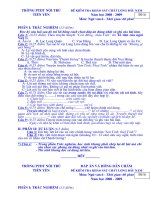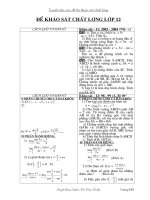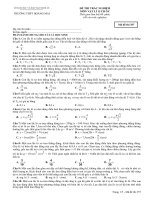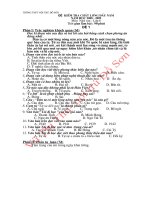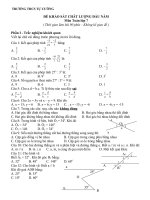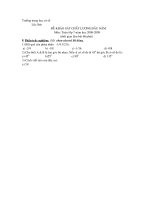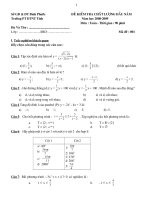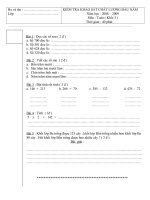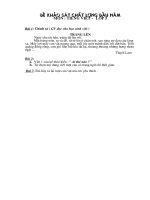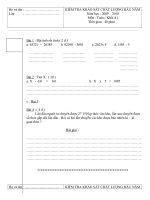ÔN TẬP KHẢO SÁT CHẤT LƯỢNG ĐẦU NĂM
Bạn đang xem bản rút gọn của tài liệu. Xem và tải ngay bản đầy đủ của tài liệu tại đây (159.76 KB, 13 trang )
BÀI TẬP ÔN THI KIỂM TRA CHẤT LƯỢNG ĐẦU NĂM LỚP 12 – LẦN 1
PHONETICS:
1. A. invited B. attended C. celebrated D. displayed
2. A. removed B. washed C. hoped D. missed
3. A. knocked B. naked C. stopped D. called
4. A. looked B. laughed C. moved D. stepped
5. A. wanted B. parked C. stopped D. watched
6. A. miles B. words C. accidents D. names
7. A. sports B. plays C. house holds D. minds
8. A. makes B. views C. reads D. decides
9. A. albums B. tanks C. shops D. plants
10. A. gets B. loves C. sings D. buys
VERB TENSES/ FORMS
1. This is the first time she (be) ……………………………….here.
2. My friend arrived after I (wait)………………………………….for her about half an hour.
3. (you, begin)……………………………….to rain before you woke up this morning?
4. Columbus (discover)…………………..…………….America more than 400 years ago.
5. He fell down when he (run)…………………………………….towards the church.
6. We (still, live)…………………..…………….there when our father died.
7. I (be)………………………………………..to New York three times this years.
8. I’ll come and see you before I (leave)…………………………..………….for America.
9. John (read)………………………………………..a book when I saw him.
10. Almost everyone (leave)……………………………………….for home by the time we arrived.
11. He (write) ……………………………………….the two famous novels since 1999.
12. I have never played badminton before. This is the first time I (try)……………………………………………
13. Since he left, I (hear) …………………………………………… nothing from him.
14. “Did you meet Ann here at the university?” -“No, we (meet)………………………when I started college.”
15. All the tickets (sell) ………………………………….out by the time we got to the theatre.
16. At present, they (experiment)……………………………………….with the medicines to cure this terrible
disease.
17. The teacher made them (keep)……………………………silent.
18. She was able (sing)……………………………..English when she was very young.
19. Could you please stop (make)…………………………so much noise? I’m studying.
20. Let your name(write)……………………………….in the sheet of paper.
21. We hoped (help)………………………………….by our teacher.
22. Dr. Clark doesn’t mind (call) ………………………………..at home if there is an emergency.
23. He will take the dog out for a walk as soon as he (finish)…………………..………………..dinner.
1
24. Our government (develop)…………………………………a system of private schools in a near future.
A/ CÂU TƯƠNG ĐƯƠNG VỀ THÌ
* Finish each of the following sentences in such away that it means exactly the same as the sentence printed.
1. I haven’t eaten this kind of food before.
This is the first………………………
2. What a pity you failed your driving test.
I wish…………………………………..
3. I haven’t been to Britol for 3 years.
The last time………………………….
4. How long is it since they bought the house?
When……………………………..
5. John has not had his hair cut for over six months.
It is…………………………………….
6. The water was so cold that the children couldn’t swim in it.
The water was not…………………………..
7. I started working for the company a year ago.
I’ve been…………………………..
8. I last saw him when I was a student.
I haven’t………………………………………..
9. James spoke to his lawyer before signing the contract.
James didn’t………………………………
10. They travelled across India, and then flew on to Japan.
After…………………………………………….
11. Robert and Catherine have been married for 4 years.
It’s four years………………………………….
12. When you phoned me, it was my lunchtime.
When ……………………………………………………………………………………………
B/ REPORTED SPEECH
* Complete the following sentences without changing their meanings:
1. The doctor said to me, “Did you feel painful on your back last night?”
The doctor asked me ………………………………………. ……………………………………
2. Mary said, “Let’s go to a movie.”
Mary suggested………………………………………………………………………………….. .
3. “I didn’t break the windows”, Bill said.
Bill denied .........................................................................
4. “You told a lie, Tom”, she said.
She accused Tom ...............................................................
5. “I can’t go to your birthday party next Saturday evening, Jack”, said Mary.
Mary apologized for...........................................................
6. “I won’t help you with your homework. Never ! ” Jane said to me.
Jane refused .......................................................................
2
7. Joe said, “Please come to my party.”
Joe invited..........................................................................
8. Mr. Gray said, “Don’t play in the street.”
Mr. Gray warned the children not …………………………………………………………………….
9. “Would you like to come on a picnic with us?
They invited …………………………………………………………….. ………………………….
10. “Please don’t tell anybody what happened.”
He asked ………………………………………………………………………………………
C/ PASSIVE VOICE
1. They built this building twenty years ago.
...............................................................................................................................................
2. They have provided the victims with food and clothing.
.....................................................................................................................................................
3. The doctors are going to perform the operation next week.
.....................................................................................................................................................
4. We can hardly find him at home because he is always on the move.
........................................................................................................................................................
5. Many people believe that these men robbed the bank last night.
...........................................................................................................................................................
D/ CONDITIONAL SENTENCES
1. They can’t do the test because they are very difficult.
If............................................................................................................................................................
2. You drink too much coffee, that’s why you can’t sleep.
If.............................................................................................................................................................
3. The policeman showed me the way, so I found the house.
If.............................................................................................................................................................
4. I want to help you but I am not sure I have free time.
If............................................................................................................................................................
5. We stayed up all night, and that‘s why we’re so tired this morning.
If............................................................................................................................................................
E/ RELATIVE CLAUSES
• Combine the sentences
1. The doctor is with a patient. The patient’s leg was broken in an accident.
.....................................................................................................................................................
2. Ha Long bay is a wonderful place. I’d love to visit it some day.
......................................................................................................................................................
3. You didn’t tell us the reason. We have to cut down our daily expenses for that reason.
....................................................................................................................................................
4. I come from a city. It is located in the southern part of the country.
...................................................................................................................................................
.
5. The scientists are making progress. They are researching the causes of cancer.
.....................................................................................................................................................
3
BÀI TẬP ÔN THI KIỂM TRA CHẤT LƯỢNG ĐẦU NĂM LỚP 12 – LẦN 2
F /ADVERBIAL CLAUSES OF CONCESSION:
1. Though he drove carefully, he had an accident yesterday.
In spite of ______________________________________________________________
2. Even though her grades were low, she was admitted to the university.
Despite ________________________________________________________________
3. I like living in the dorm even though it is noisy.
In spite of ______________________________________________________________
4. They enjoyed themselves despite the hard work.
Although _______________________________________________________________
5. They wanted to climb the mountain in spite of the danger.
Though _________________________________________________________________
6. Although the weather was extremely hot, they went jogging in the park.
Despite ________________________________________________________________
7. That man managed to get out of the car despite his injured foot.
Although _______________________________________________________________
G/ ADVERBIAL CLAUSES OF RESULT
1. The quiz was too difficult for us to answer.
The quize was so …..
2. This road is too dangerous for you to walk alone.
This road isn’t …..
3. This restaurant is so dirty that we can’t continue having dinner there.
It is such …..
4. He drives so carelessly that he has caused two accidents this week.
He is such ……
5. This handwriting was so small that I couldn’t read it out.
This handwriting was too …………………
WORD FORM
1.
Parents are (oblige)________________________ by law to send their children to school.
2.
Some people are concerned with physical (attract)___________________________ when
choosing a wife or husband.
3.
What could be more (romance)____________________ than a wedding on a tropical
island?
4.
You really should (conservation)______________ your energy for the difficult climb
ahead.
5.
She studies many magazines and books about fashion, entertaining and correct social
(behave) _________________________ as she wants to appear elegant.
4
6. In a new culture, many embarrassing situations occur because of a (understand)
______________________
7.
I (person)___________________________ think that we should do something
immediately to change the situation that we are in.
8. It's OK to use (formal)__________________ language if you're speaking to a friend.
9.
The proposal will go ahead despite strong (object)________________from the public.
10.
After listening to all the (argue)________________ I am now of the opinion that there
should be no new road.
READING COMPREHENSION
PASSAGE 1:
Many people think that we can learn a lot about the culture of a foreign country simply by living in that
country. However, this is not necessarily true. Often, the longer we stay in a foreign country, the more we realize
how little we actually know about the culture of that country.
Books and talks about other people’s culture can even be dangerous because they concentrate on cultural
differences and exaggerate national character, and sometimes a lot of information they contain is true.
In a study recently carried out in Britain, people were asked to make a list of anything that they thought was
typical of Britain and would interest a foreign visitor there. Most mentioned Shakespeare; the Queen, village inns,
English folk dancing, English castles, and fish chips wrapped in newspaper. Although all of these characters can
be found in British culture, they do not show the real interest of ordinary British people: (They are, in fact, simply
stereotype- that is, general character which people wrongly think are typical.) What is surprising is that they were
suggested by British people themselves as representing their culture. If people have such a wrong impression of
their own culture, how much false would their impression of other culture be!
1. Is it necessarily true when many people think that we can learn a lot about the culture of a foreign country
simply by living in that country?
..................................................................................................................................................................
2. Why can books and talks about other people’s culture even be dangerous?
.................................................................................................................................................................
3. What were the people asked to do in a study recently?
................................................................................................................................................................
4. Where can the characters be found?
..................................................................................................................................................
PASSAGE 2
handshake greet wave customary automatically
another purpose own other show
Today, in many parts of the world, it is (1)……….. for people to shake hands upon meeting as gesture
of good will. Originally, however, the practice of shaking hands had a more practical (2)………..
Shaking hands originated in medieval times. In those days, when a man came on a stranger, he would
often (3)………… reach for his sword with his right hand, in case he had to use the weapon to defend
himself. Sometimes, both parties found themselves circling around each (4)………, weapons in hand,
until it was mutually agreed that the weapons could be laid aside. Then, the two parties extended their
right hands to (5)………..they had no weapons, and clasped them. This was the beginning of the (6)…….
The custom of shaking hands is not a universal one. In the Orient, people have, for centuries, clasped
5
